Wyandotte County Museum to host exhibit
 The United States Holocaust Memorial Museum sends traveling exhibits all over the country, but none has ever visited Wyandotte County, Kan., until now.
The United States Holocaust Memorial Museum sends traveling exhibits all over the country, but none has ever visited Wyandotte County, Kan., until now.
On April 20, the Wyandotte County Historical Museum, 631 N. 126th, Bonner Springs, Kan., will host the USHMM exhibition “Fighting the Fires of Hate: America and the Nazi Book Burnings.”
The exhibit, which continues through June 17, provides a vivid look at the first steps the Nazis took to suppress freedom of expression, and the strong response that occurred in the United States both immediately and in the years thereafter. The exhibition focuses on how the book burnings became a potent symbol during World War II in America’s battle against Nazism, and concludes by examining their continued impact on our public discourse. There is no charge for the exhibit or the speaker series. (See below for more information.)
In conjunction with “Fighting the Fires of Hate,” the Wyandotte County Historical Museum will display “Our Jewish Past,” highlighting contributions made by the Jewish community to the county’s history. This museum exhibition will feature panels highlighting businesses, synagogues and individuals of Wyandotte County. At one time, three synagogues were located in Wyandotte County, including Ohev Sholom, the oldest synagogue still in existence in the state of Kansas.
‘Fighting the Fires of Hate’
Jessica Rockhold, the Midwest Center for Holocaust Education’s director of school programs and teacher education, said the interesting thing about “Fighting the Fires of Hate’ is that it’s not a Holocaust exhibit per se. It’s about the Nazi book burnings that happened in May of 1933.
“So it predates anything about passing laws against the Jews or killing Jews in any way. This is more about the kind of culture and the kind of society that the Germans wanted to build that eventually enabled them to do those other things,” Rockhold said. MCHE provided grants for the exhibit along with the Kansas Humanities Council, Kansas City Kansas Public Library and the Barton P. and Mary D. Cohen Charitable Trust.
Rockhold said this exhibit’s message is very universal and especially resonates for Americans because freedom of expression is one of the things “we hold so dear.”
“So it’s an exhibit about the book burnings specifically, but also the American reaction to the book burnings, and it gives an opportunity to talk about those kinds of issues and why they are important to Americans,” Rockhold continued.
“I think this exhibit offers a really different and interesting way to approach this kind of history,” she said. “Everybody should go see it.”
Trish Schurkamp, the museum’s executive director, said they are excited the museum was selected to display this very timely exhibit.
“From the planned burning of the Quran in Gainsville, Fla., to the changing of words considered derogatory in Mark Twain’s ‘The Adventures of Tom Sawyer,’ this exhibition gives message that we should not forget,” Schurkamp said.
Schurkamp said the museum began negotiating with the USHMM about a year ago to house a traveling exhibit. The application process is strict and the USHMM has to approve the space as well as the security.
“There are very stringent codes we had to go through to get this exhibit,” she said.
One reason Wyandotte County approached the USHM for a traveling exhibit, Schurkamp said, is because she is Jewish.
“I also knew that Wyandotte County had a Jewish past and felt it was something we needed to highlight. We are a county museum so we do highlight different ethnic groups in Wyandotte County and it’s one of the groups we had failed to highlight. So we wanted to get an exhibit that would work with our exhibit,” Schurkamp said.
The two exhibits are separate but will be held in the same room. Schurkamp said visitors will first walk through “Fighting the Fires of Hate,” and then end with “Our Jewish Past.” She estimates 30 to 40 people can comfortably view the exhibits at one time. Because many large school groups have made reservations to see the exhibit, films about Kristallnacht and local survivors, provided by MCHE, will be available for groups, and individuals, to view in addition to the two exhibits.
Schurkamp is excited about the interest these exhibits has created.
“We’ve got 450 students booked to attend the exhibit, all the way from Salina (Kansas) to the greater Kansas City area. We’re just amazed at where they are coming from. And that comes from our partnership with the Midwest Center for Holocaust Education. They’ve been a phenomenal partner with getting this information out,” Schurkamp said.
‘Our Jewish Past’
Schurkamp, who has been associated with the Wyandotte County museum for nine years, said she has been collecting material about the Jewish community in the county for quite some time. One of the museum’s trustees was the late Bart Cohen, who collected a lot of Jewish history, and he helped spark her interest.
It is an 11-panel exhibition that highlights different aspects within the Wyandotte County Jewish history. It starts with the first synagogue that was formed by Jewish immigrants in the 1870s.
“They settled in the packing districts of Armourdale, known as the bottoms, and they met in homes at that point,” said Jennifer Laughlin, the museum’s curator.
“The first congregation was called Gomel Chesed,” Laughlin said.
Besides the local synagogues, the exhibit will focus on successful Wyandotte County Jewish businesses found on Minnesota Avenue and Central Avenue. Lastly, prominent Jewish people — including Barnett, Morris and Joseph Cohen, the Helzberg family, the Greenberg family and Milton Feld, Asner family and the Katz family — will be featured.
Laughlin said Rabbi Marshall Miller is highlighted as well as the Asner Torah.
“The Asner family was very instrumental in the Jewish community here in Wyandotte country,” Laughlin said. “Rabbi Miller was the main Jewish religious leader in Wyandotte County, who was here from 1937 until he died in 1965.”
‘Fighting the Fires of Hate’ speaker series
Several special events will be held in conjunction with the “Fighting the Fires of Hate” exhibit. They include:
• May 1
Plant Tree in Remembrance of Yom HaShoah on the Wyandotte County Museum Grounds
1 to 1:30 p.m.
Holocaust Survivor Mike Jacobs discusses ‘Triumph over Tragedy’
2 p.m.
George Meyn Community Center located at Wyandotte County Park
• May 10
Third Reich/2010: Censorship Then and Now Presented by Ronda Hassig, NBCT, a librarian Harmony Middle School and a member of the MCHE Teaching Cadre
5:30 to 6:30 p.m.
Exhibition viewing and reception
6:30 p.m. program
George Meyn Community Center located at Wyandotte County Park
• May 12
Witnesses to the Holocaust: Kristallnacht Presented by Dr. Francis Glazer Sternberg, director of university programs & adult education at the Midwest Center for Holocaust Education
5:30-6:15 p.m.
Exhibition viewing and reception
Wyandotte County Museum
6:30 p.m. program
George Meyn Community Center located at Wyandotte County Park
• May 26
The Nazi Book Burnings: The Third Reich’s Prelude to the Destruction of European Jewry Presented by Kevin Baker and Kelsey Rosborough, graduate students at University of Missouri-Kansas City
5:30-6:30 p.m.
Exhibition viewing and reception
6:30 p.m. program
Wyandotte County Museum
• June 9
Holocaust & War Victims Tracing Service
Presented by Jennifer Tarwater, director of Disaster Services, The American Red Cross
5:30-6:30 p.m.
Exhibition viewing & reception
6:30 p.m. program
George Meyn Community Center at Wyandotte County Park
• June 12
Steve Cole, member of the Second Generation Speakers Bureau, Midwest Center for Holocaust Education
2 p.m.
George Meyn Community Center located at Wyandotte County Park
For more information on the exhibition and guest speakers highlighting the exhibits at the Wyandotte County Historical Museum visit www.wycomuseum.wordpress.com.



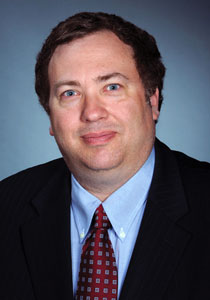 Anytime you hear or read a news report of any kind — newspaper, radio or television, or Internet — it’s likely at least one Middle Eastern country will be mentioned. So David Makovsky knows that when he comes to Kansas City next week on Wednesday, April 13, people will want to know what the turmoil in the Middle East means for Israel. He’ll discuss that and the future of the Israeli-Egyptian peace treaty in a presentation titled, “After Egypt: Looking at Prospects of Mideast Peace,” at 7:30 p.m. at the White Theatre at the Jewish Community Campus. The event is free and sponsored by Jewish Community Center, Jewish Community Relations Bureau|American Jewish Committee and Jewish Federation of Greater Kansas City.
Anytime you hear or read a news report of any kind — newspaper, radio or television, or Internet — it’s likely at least one Middle Eastern country will be mentioned. So David Makovsky knows that when he comes to Kansas City next week on Wednesday, April 13, people will want to know what the turmoil in the Middle East means for Israel. He’ll discuss that and the future of the Israeli-Egyptian peace treaty in a presentation titled, “After Egypt: Looking at Prospects of Mideast Peace,” at 7:30 p.m. at the White Theatre at the Jewish Community Campus. The event is free and sponsored by Jewish Community Center, Jewish Community Relations Bureau|American Jewish Committee and Jewish Federation of Greater Kansas City.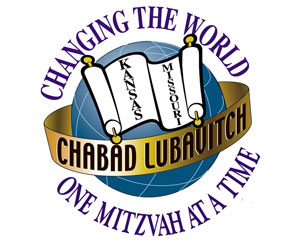 Chabad Centers across the states of Kansas and Missouri are making plans to assure that there is a seat for every Jew at the seder table this Passover.
Chabad Centers across the states of Kansas and Missouri are making plans to assure that there is a seat for every Jew at the seder table this Passover.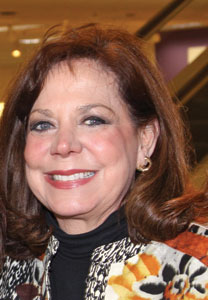 Some 50 years ago, before Facebook and Twitter, there was Women’s Division.
Some 50 years ago, before Facebook and Twitter, there was Women’s Division.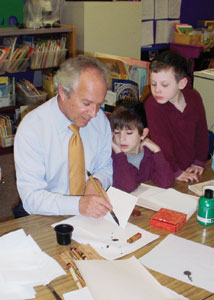 In 1966 six families dreamed of providing a Jewish day school education for their children. While many were skeptical it could survive, the Hyman Brand Hebrew Academy not only survived, but grew and continues to thrive. It will celebrate its 45th anniversary at the annual Civic Service Awards Dinner on April 10 at Hyatt Regency Crown Center. Maria Devinki and the late Fred Devinki will receive the 2011 Civic Service Award for their philanthropic efforts in the community. (For more information, contact Kerry Cosner at (913) 327-8156.)
In 1966 six families dreamed of providing a Jewish day school education for their children. While many were skeptical it could survive, the Hyman Brand Hebrew Academy not only survived, but grew and continues to thrive. It will celebrate its 45th anniversary at the annual Civic Service Awards Dinner on April 10 at Hyatt Regency Crown Center. Maria Devinki and the late Fred Devinki will receive the 2011 Civic Service Award for their philanthropic efforts in the community. (For more information, contact Kerry Cosner at (913) 327-8156.)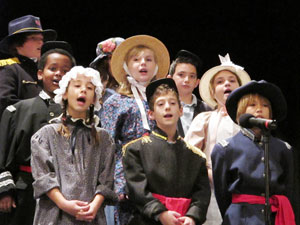 Head of School Haas has found that the programs HBHA offers today are extremely innovative and unique. Because of those programs, and the school’s talented and passionate staff, he is happy to report that the future looks bright.
Head of School Haas has found that the programs HBHA offers today are extremely innovative and unique. Because of those programs, and the school’s talented and passionate staff, he is happy to report that the future looks bright. Jewish federations have so far raised nearly $1 million to support the victims of the 9.0 magnitude earthquake that struck near the coast of Japan on March 11. Those funds are being used in part to help pay for the American Jewish Joint Distribution Committee’s continuous, on-the-ground response in Japan. The deadly earthquake, ensuing tsunami and continuing nuclear crisis have left a reported 10,800 dead, while more than 16,000 remain missing and over 190,000 are living in shelters.
Jewish federations have so far raised nearly $1 million to support the victims of the 9.0 magnitude earthquake that struck near the coast of Japan on March 11. Those funds are being used in part to help pay for the American Jewish Joint Distribution Committee’s continuous, on-the-ground response in Japan. The deadly earthquake, ensuing tsunami and continuing nuclear crisis have left a reported 10,800 dead, while more than 16,000 remain missing and over 190,000 are living in shelters.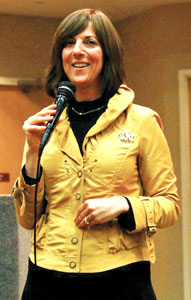 A few weeks ago Lori Palatanik, director of the Jewish Women’s Renaissance Project, was in Kansas City as a guest of the Community Kollel of Kansas City. At one event attended by more than 100 young adults, she discussed the Transform and Grow Israel Tour JWRP sponsors every summer. The women who were there were intrigued.
A few weeks ago Lori Palatanik, director of the Jewish Women’s Renaissance Project, was in Kansas City as a guest of the Community Kollel of Kansas City. At one event attended by more than 100 young adults, she discussed the Transform and Grow Israel Tour JWRP sponsors every summer. The women who were there were intrigued.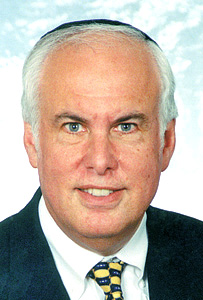 Lunch is always a challenge for those who work during Passover. For the past 25 years Kehilath Israel Synagogue has tried to make that easier by sponsoring strictly kosher-for-Passover luncheons downtown. This year they will be held at noon on the two intermediate days of Passover, Thursday and Friday April 21 and 22.
Lunch is always a challenge for those who work during Passover. For the past 25 years Kehilath Israel Synagogue has tried to make that easier by sponsoring strictly kosher-for-Passover luncheons downtown. This year they will be held at noon on the two intermediate days of Passover, Thursday and Friday April 21 and 22.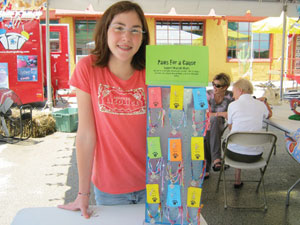 The lack of and desire to have a pet, led to Elizabeth Gerson’s Bat Mitzvah project, “Paws for a Cause.” Like many today, having a Bat Mitzvah means learning to give back to society. And Elizabeth did that in a big way! She earned more than $2,000 that was split between Wayside Waifs and Animal Haven, two animal shelters in the Kansas City area.
The lack of and desire to have a pet, led to Elizabeth Gerson’s Bat Mitzvah project, “Paws for a Cause.” Like many today, having a Bat Mitzvah means learning to give back to society. And Elizabeth did that in a big way! She earned more than $2,000 that was split between Wayside Waifs and Animal Haven, two animal shelters in the Kansas City area. Once upon a time Gevura Davis was called Lauren and wanted to be editor of The New York Times. Today, when she thinks about her goals, she’s reminded of what one of her favorite rabbis said: “To be a Jew and live Judaism is to try to take care of as many people with your one precious life that you can, starting with yourself, your family and your community.”
Once upon a time Gevura Davis was called Lauren and wanted to be editor of The New York Times. Today, when she thinks about her goals, she’s reminded of what one of her favorite rabbis said: “To be a Jew and live Judaism is to try to take care of as many people with your one precious life that you can, starting with yourself, your family and your community.”